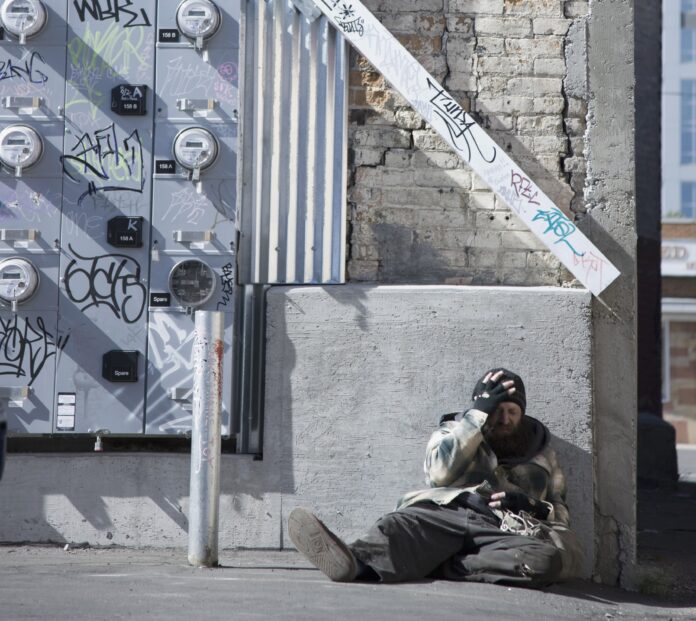San Diego County Board of Supervisors Chairwoman Nora Vargas on Feb.1 presented the State of the County Address, acknowledging the moment coinciding with the start of Black History Month, and thanking social justice advocates for addressing systematic racism and elevating the work that has yet to be done.
Vargas said that all communities need to be “seen and heard,” as she talked about the past, present, and future for residents, housing, small businesses, homelessness, mental healthcare, childcare, public safety, and environmental justice.
“I am talking about the parents, the neighbors, the essential workers, the small business owners, our community health workers, our first responders, our childcare providers, our nurses, our nonprofit partners,” she said. “I want you to know that each of you is an important piece in the fabric of our diverse community. I also want you to know that we are going to overcome our toughest challenges ahead by working together.”
Vargas said when she first took office during the height of the pandemic, she saw firsthand the hardships families were facing, trying to make ends meet, and stay in their homes.
“As a county, we immediately worked to expand access to rental assistance and close loopholes to stop unfair evictions,” she said. “Our Housing and Community Development department awarded $244 million in rent and utility assistance to over 23,000 households in San Diego County. These were working families who could have ended up on the streets without this emergency assistance. Prioritizing the needs of our working families to maintain stable housing is a top priority.”
Moving forward, Vargas said she will work with cities in the region to expand rental protections, continue to build affordable housing, create new paths to economic prosperity for all and to enhance community infrastructure.
“While employment has recovered, inflation is now causing families to go into debt,” she said. “We are going to accomplish these goals while supporting local small businesses and working families in creating new jobs and fighting for environmental justice.”
To accomplish this, Vargas said, the county needs to start with the basics – “people need to have a roof over their head and food to eat.”
There is a homeless epidemic in the county, said Vargas, and that there is not a one size fits all solution or political slogan that will fix the complex and layered problem. She said everyone needs to be at the table in resolving this issue.
“The hard truth is that today there are nearly 100,000 families living on less than $35,000 a year,” she said. “So many of these families are merely a paycheck away from becoming homeless. The cost of living is increasing. The cost of housing is increasing. And folks are not making nearly enough to support themselves and their families.”
Vargas said the County’s policies impact people and that the board must find humanity in its solutions.
“Preventing and addressing homelessness is a top priority,” she said. “That is why I declared homelessness as a public healthcare crisis so the county can serve as a convener between the 18 cities and unincorporated areas. Together, with my colleague Supervisor Joel Anderson, we are finding ways to streamline the creation of emergency housing through our compassionate housing solution creating public-private partnerships with faith-based and community organizations to set up cabin shelters and we are investing $1.5 million to launch this program.”
Vargas said she would continue Supervisor Nathan Fletcher’s leadership in addressing veteran homelessness by identifying the gaps and resources to bring housing solutions.
“We absolutely cannot stand by and let those who sacrificed so much for our country be unhoused,” she said.
Vargas said she was concerned that more and more seniors are becoming unhoused.
“We know that 24% of the homeless population counted in 2022 were over the age of 55,” she said. “We are launching a thriving seniors initiative to make sure the generation that took care of us is taken care of. We are investing $2.75 million on a subsidy program to help older adults who are a paycheck away from being unsheltered. Each senior in this program is going to receive $500 per month to help pay their rent. We are also creating a blueprint for senior centers that focuses on meeting the needs of the growing senior population.”
Vargas said a partnership with the San Diego Senior Community Foundation, through the Seniors Master plan, will expand services for senior centers to be a hub for services and recreation.
“We live in a state that is the fourth largest economy in the world,” she said. “No senior or child should wonder where they are going to lay their head for the night. As we move forward in 2023, we will leverage state and federal funding with nonprofit and philanthropic partners to develop the housing that we need.”
Vargas said with the growing number of unhoused LGBTQ+ youth, the County is investing $7.2 million to support transitional aged youth with housing and wrap around support services over the next five years, and $5 million will go to LGBTQ+ youth experiencing homelessness.
As important as housing, Vargas said one in four San Diegans do not have access to quality food.
“No one should be going hungry,” she said. “Throughout our county we have food deserts where access to quality food is not an option. I am committed to partnering up with food banks, food hubs, and food pantries to make sure all communities in our region have increased access to healthy food. We are going to expand community agriculture for healthy and local produce through increased community gardens at our county facilities and working to give communities access to fruits, vegetables, and nutritional food that they need to live healthy and vibrant lives.”
Vargas said mental health is healthcare, and the pandemic has increased the need for mental health issues, which often are precursors to substance abuse and homelessness.
“We are making historic investments in improving mental health outcomes,” she said. “We are working together with schools and stakeholders to provide the services that our kids need. Last year, our board allocated approximately $30 million for mental health services and projects that focuses on children and youth as well as $2 million to support homebound individuals who are recipients of In-Home Supportive Services.”
“With county funding, we created the new Screening to Care initiative to provide universal mental health screenings for all middle school students in the county of San Diego,” she continued. “We invested $3.2 million to support community harm reduction outreach teams responding to mental healthcare crises and provide transitional housing at safe haven facilities for those with behavioral health needs.”
Vargas said “thoughts and prayers’ were not enough in the wake of devastating mass shooting across the country, and though San Diego still tracks below the national rate, public safety is a priority.
“In partnership with Sheriff Kelly Martinez, we are launching a community safety initiative to address gun violence and public safety,” she said. “With Supervisor [Jim] Desmond, we created an awareness campaign in multiple languages to ensure we continue educating our high school and college age students and parents about the dangers of fentanyl. From expanding education in vulnerable communities and making life saving NARCAN available, we are working to stop the tragic overdoses and deaths we saw from this dangerous drug.”
Vargas said the county needs to ensure first responders have necessary tools and resources, and that the East Otay Mesa Fire Station completion by the end of the year is the type of investments needed in communities.
Vargas said small businesses are the backbone to a strong economy, and many of them were hit hard by the pandemic and still need help in recovery.
“Not only do they make up most of the businesses of the county but they also employ 60% of our workforce,” she said. “That is why I championed a division on economic prosperity and community development. This office serves as a hub to connect businesses to resources that will help them thrive and create a diverse local economy. This board of supervisors has awarded close to $26.2 million in grants to support local businesses.”
Vargas said you cannot have a strong workforce without access to high quality childcare.
“More than 190,000 children under the age of 12 are without childcare, forcing some parents to choose between staying home or working,” she said. “Childcare for all needs to be our goal. We have the opportunity to build the generation of childcare entrepreneurs and support parents entering the workforce. It is common sense that if we want more people taking care of kids, they must be paid well for their hard work.”














